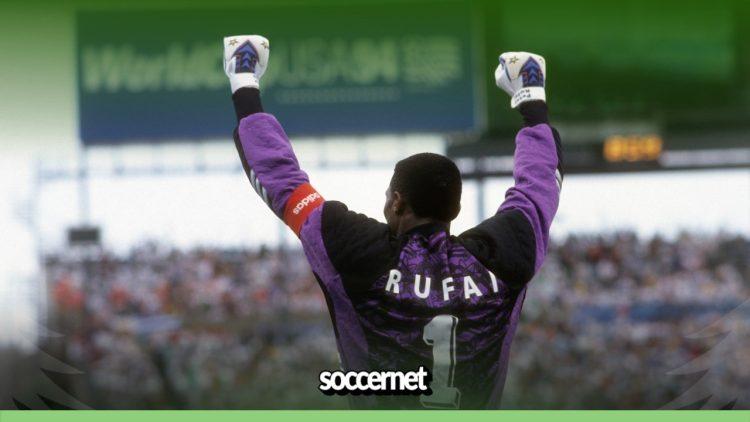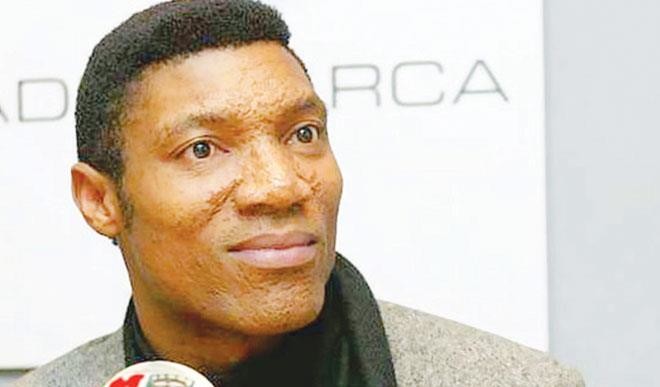Death of Nigerian Goalkeeping Legend Peter Rufai

The Nigerian football community, both at home and globally, has been plunged into profound sorrow following the death of legendary Super Eagles goalkeeper, Peter Rufai, who passed away on Thursday, July 3, 2025, at the age of 61. Reports indicate that the charismatic goal-tender, affectionately known as 'Dodo Mayana', had been battling an illness for some weeks before his demise at a Lagos hospital. The Nigeria Football Federation (NFF) expressed deep shock, with General Secretary Mohammed Sanusi stating the federation was unaware of his illness. Condolences have poured in from all corners, including Dr. Patrice Motsepe, President of the Confédération Africaine de Football (CAF), who described Rufai as part of a special generation that made Africa proud. Senate President Godswill Akpabio also extended his sorrow, hailing Rufai as a national icon and a proud symbol of Nigeria’s football legacy.
Born on August 24, 1963, in Lagos, Peter Rufai's journey to becoming a football legend was both unique and inspiring. His father was a king in Idimu, Lagos, while his mother hailed from Port Harcourt. After spending his early years in Lagos, Rufai relocated with his mother to Kaduna in northern Nigeria, where he discovered his profound love for football, often forgetting to eat due to his passion for the game. The outbreak of the Nigerian Civil War in 1967 forced his mother and young Peter to move to Port Harcourt for safety. During this tumultuous period, to protect him from retaliatory attacks by Biafran soldiers, his mother made a hasty decision to drop his Yoruba name, giving him the more neutral first name, "Peter." His path to goalkeeping was equally accidental; during an inter-school match where his team's frustrated goalkeeper stormed off, Rufai, then a midfielder, impulsively stepped into the goalpost. His natural talent shone through as he blocked shots with every part of his body, leading his team to victory and cementing his new role as a goalkeeper.
His raw talent was further refined by a coach identified as "Tiger" after a demoralizing defeat in a U13 competition. Shortly after, while training to become an electrician at Government Vocational School in Port Harcourt, he was scouted by Sharks FC. At just 17, Rufai made a bold, secret journey to Lagos to try out for Stationery Stores FC, a powerhouse in Nigerian football. Despite attending the screening in his "Christmas shoes" without proper football boots, he was selected. A year later, he was the goalkeeper for Stationery Stores in the 1980 FA Cup final. In 1981, at 18, he was instrumental in leading Stationery Stores to the final of the CAF Cup Winners' Cup, saving a penalty in the first leg before an injury forced him off in the return leg, where the team narrowly lost.
Rufai's trailblazing career saw him become the first Nigerian goalkeeper to play professionally abroad when he signed for Dragon FC of the Republic of Benin in 1985. His career then took him to Europe, where he spent six years in Belgium playing for K.S.C. Lokeren Oost-Vlaanderen and K.S.K. Beveren. He also had stints with Go Ahead Eagles in the Netherlands, S.C. Farense in Portugal, and Deportivo La Coruña in Spain, famously keeping a clean sheet in a 1-0 La Liga victory over Tenerife in 1998.
His most memorable achievements came with the Nigerian national team, the Super Eagles. He made his debut for the then-Green Eagles in a friendly match in December 1981. Rufai earned Africa Cup of Nations silver medals in 1984 and 1988, but it was in 1994 that he truly etched his name in history. As the first-choice goalkeeper, he played a pivotal role in Nigeria's triumph at the 1994 Africa Cup of Nations in Tunisia, including a crucial penalty save against Côte d’Ivoire in the semi-final. He served as the Super Eagles' first-choice goalkeeper for Nigeria's debut FIFA World Cup appearance in 1994 in the USA, where he captained the team, and again at the 1998 FIFA World Cup in France, with the team reaching the Round of 16 on both occasions. With over 60 caps for Nigeria, he was widely regarded as the "safe hands" behind Nigeria's "golden football generation," often described as the "spine" and "foundation" upon which the team's successes were built.
Even after retiring from the national team following the 1998 World Cup, Rufai remained deeply committed to football. In 1998, he famously turned down the ancestral throne after his father's death, choosing instead to continue his football career in Europe. He dedicated his post-retirement days to discovering and mentoring young players, working as a sports administrator in Belgium and the Netherlands, and later opening a goalkeeper's school in Spain. Upon returning to Nigeria, he established a football development program to nurture local talent, reflecting his desire to give back to the nation. In June 2025, he raised concerns over identity theft, alleging his digital and corporate information had been hacked. Rufai is survived by his wife and children, including his oldest son, Senbaty, who also played professional football.
The tributes flowing in underscore Peter Rufai's immense legacy. Media personality Devoyce and former teammate Waidi Akanni highlighted his kindness, great sense of humor, free spirit, and profound affection for children. Fans across social media platforms have mourned his passing, reflecting on his "outstanding on-field and off-field performances." CAF President Dr. Patrice Motsepe praised his talent and his role in making Nigeria and Africa proud, while Senate President Akpabio remembered his "indelible exploits" and "unbeatable" performances. The passing of 'Dodo Mayana' is particularly poignant as he joins other key members of the iconic 1994 AFCON-winning squad who have also passed away, including Stephen Keshi, Rashidi Yekini, Thompson Oliha, Uche Okafor, and Wilfred Agbonivbare. His impact was felt even during his final days, as Super Falcons star Asisat Oshoala paid tribute to him by writing his name on her wristband during a match, a stark contrast to the controversy surrounding teammate Rinsola Babajide's tribute to a foreign player. Peter Rufai's legacy as a myth, an inspiration, and a cornerstone of Nigerian football will forever live on in the hearts and minds of many.
You may also like...
Diddy's Legal Troubles & Racketeering Trial

Music mogul Sean 'Diddy' Combs was acquitted of sex trafficking and racketeering charges but convicted on transportation...
Thomas Partey Facing Rape & Sexual Assault Charges

Former Arsenal midfielder Thomas Partey has been formally charged with multiple counts of rape and sexual assault by UK ...
Nigerian University Admission Policy Changes

JAMB has clarified its admission policies, rectifying a student's status, reiterating the necessity of its Central Admis...
Ghana's Economic Reforms & Gold Sector Initiatives

Ghana is undertaking a comprehensive economic overhaul with President John Dramani Mahama's 24-Hour Economy and Accelera...
WAFCON 2024 African Women's Football Tournament

The 2024 Women's Africa Cup of Nations opened with thrilling matches, seeing Nigeria's Super Falcons secure a dominant 3...
Emergence & Dynamics of Nigeria's ADC Coalition

A new opposition coalition, led by the African Democratic Congress (ADC), is emerging to challenge President Bola Ahmed ...
Demise of Olubadan of Ibadanland
Oba Owolabi Olakulehin, the 43rd Olubadan of Ibadanland, has died at 90, concluding a life of distinguished service in t...
Death of Nigerian Goalkeeping Legend Peter Rufai

Nigerian football mourns the death of legendary Super Eagles goalkeeper Peter Rufai, who passed away at 61. Known as 'Do...



